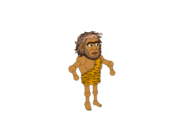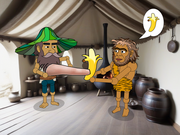人无远虑,必有近忧
Characters and words in 人无远虑,必有近忧
person; people / CL:個|个[ge4],位[wei4]
not to have / no / none / not / to lack / un- / -less
无
=
一
+
𠂇
+
乚
:
Just inside the space station's entrance, Diogenes is annoyed by Willy Walrus, who's playing his flute. Diogenes just wants a peaceful time without being disturbed, so he cuts the flute into pieces with a pair of scissors, and threatens to beat Willy Walrus with a shovel should he annoy Diogenes again.
Mnemonic symbol: 無爲, wu2 wei2, the state of non-doing after having attained complete harmony with the Tao.
Willy Walrus (w) has attained Wu Wei (無) just inside the space station's entrance (Ø2), while from the outside it may seem like he is napping.
Willy Walrus (w) has attained Wu Wei (無) just inside the space station's entrance (Ø2), while from the outside it may seem like he is napping.
certainly / must / will / necessarily
必
=
丿
+
心
:
Mnemonic symbol: 忽必烈 [Hūbìliè], Kublai Khan. Certainly (必) Kublai Khan (必) has to keep face, but he cannot hold it any longer. In the space station's bathroom (Ø4), He absolutely has to (必) tell Brunhilde (bi) his love for her strong character and offers her his heart (心). Brunhilde is a bit embarrassed because all she has to offer in return is a banana (丿). Kublai Khan feels like his heart has been crossed out (the 丿 stroke is crossing out 心 in 必).
to have; there is / (bound form) having; with; -ful; -ed; -al (as in 有意[you3 yi4] intentional)
Words with 人无远虑,必有近忧
人无远虑,必有近忧
is not used as a component in another word.
Sentences with 人无远虑,必有近忧
人无远虑,必有近忧 currently does not appear in any sentence.


